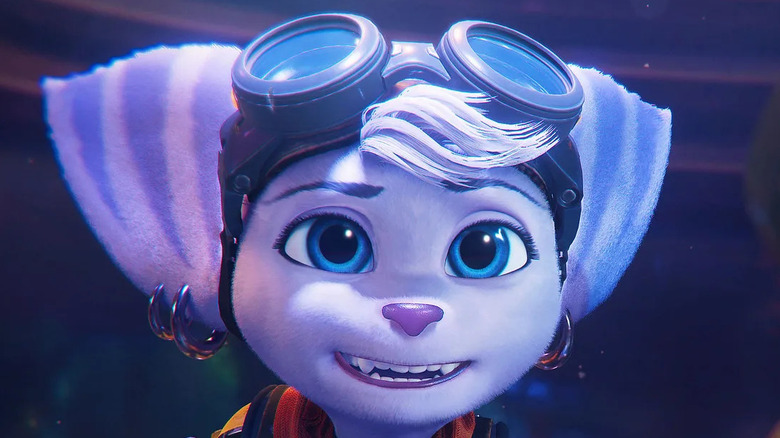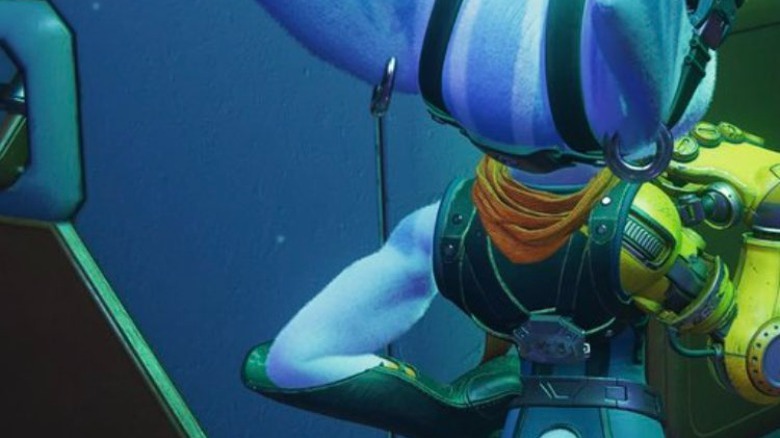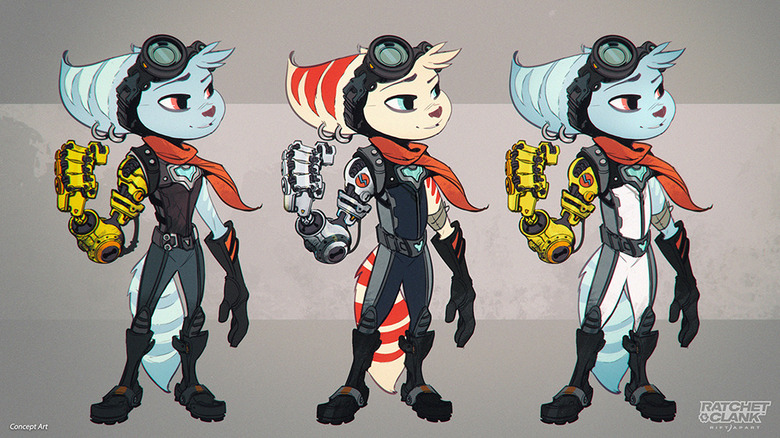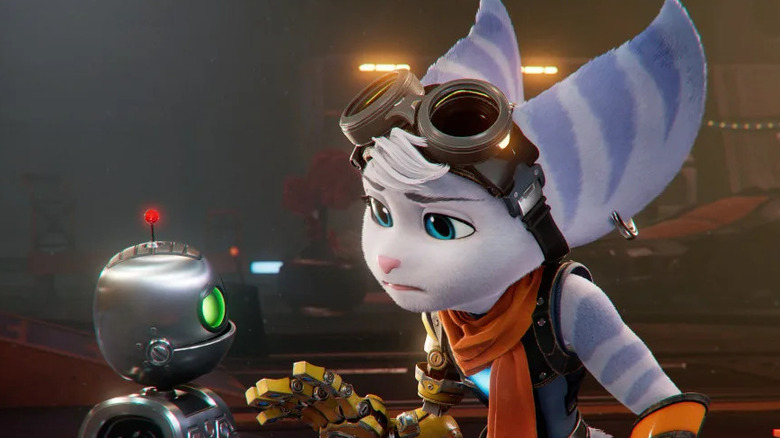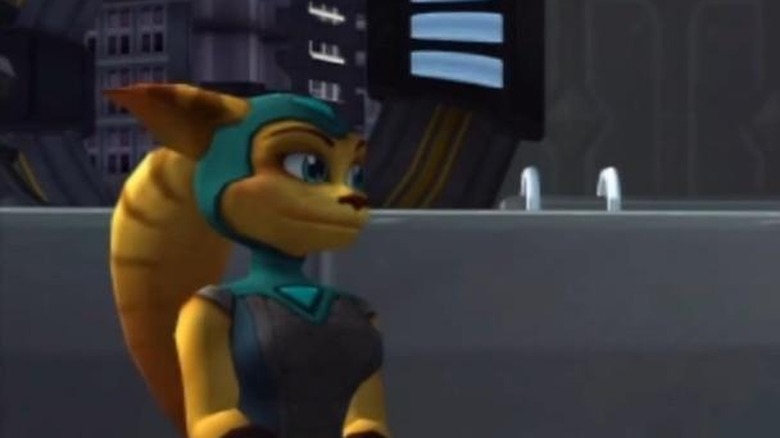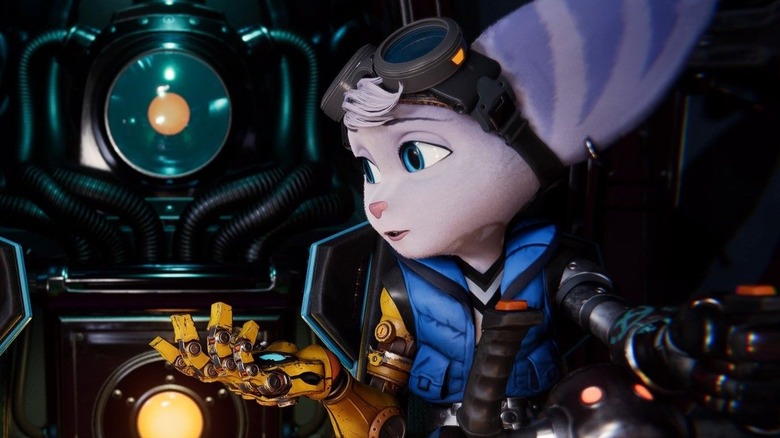The Untold Truth Of Rivet From Ratchet & Clank: Rift Apart
The team at Insomniac Games, who many thought had their hands full with the "Spider-Man" franchise, surprised gamers with the announcement of a new "Ratchet & Clank" entry in June 2020. Titled "Rift Apart," the accompanying Announcement Trailer set the industry abuzz with its dimension hopping mechanics and impressive graphics. The surprises didn't end there, however, as Insomniac concluded the video by introducing a new character: an unnamed female Lombax.
A few days following the reveal, the developer confirmed on Twitter that buyers would get to play as both Ratchet and "the mysterious new female Lombax from another dimension." The studio remained tight-lipped about its co-protagonist, fueling plenty of speculation on Reddit and social media. After almost a year, Insomniac finally shared several key details about the female Lombax, a resistance fighter named Rivet, through an article on the PlayStation Blog and a Gameplay Trailer. Critics showered "Rift Apart" with praise when it launched two months later, identifying Rivet as the game's standout character.
Rivet's glowing reception was no accident, but the result of months of careful planning and thoughtful game design.
Rivet was designed to be more muscular than Ratchet
After "Ratchet & Clank: Rift Apart" released on June 11, fans noted a key aspect of Rivet's physique. "No one told me [Rivet] was jacked," tweeted Santa Monica Studio 3D environment artist Ivanna Liittschwager. A cropped screenshot accompanied the message, showing off the Lombax's muscular bicep and deltoid. The thread took off, filled with thirsty commentary and theories from players about how the "Rift Apart" co-protagonist got so ripped.
It turns out Rivet's physical fitness was not a random design choice. Xavier, a senior 3D character artist at entertainment startup Wonderstorm, took credit for the move. "This is my fault," wrote Xavier. "Seriously. I specifically made her arms beefier than Ratchet's." Marco Villalpando, a character artist for "Rift Apart" developer Insomniac Games, shared his support for Xavier's vision. "I made damn sure this remained a staple of her design," responded Villalpando.
Multiple Twitter users thanked Xavier for "doing god's work" and named him a "hero." Meanwhile, Villalpando earned the epithet "protector of the beef" from co-worker Matt Graczyk for ensuring Rivet's jacked arm made it into the final version of the game.
Rivet was almost a very different character
After revealing Rivet as Ratchet's interdimensional counterpart in "Rift Apart," creative director Marcus Smith shared several details about the process the team used to develop the new playable character in an interview with Variety. It turns out Rivet was almost very different from the figure players encounter in the game.
Insomniac zeroed in on exploring different dimensions early in the "Rift Apart" development process, drawing inspiration from the 1964 film "It's A Wonderful Life." This led the team to question how the lives of their characters might have deviated if they had followed different paths. Specifically, Smith and the others wondered what turn Ratchet's life would have taken "if he didn't have a Clank."
Following this line of reasoning spawned several concepts, including soap opera-esque "good" and "evil" Ratchets and polar opposite counterparts to the main cast. Ultimately, Insomniac wrote these options off as too one-note, instead focusing on uniting the interdimensional pairs through core character values. Like Ratchet, Rivet fights for good. Despite growing up in a much darker dimension than the other Lombax, she managed to retain her optimism and compassion, making the pair two sides of the same coin.
The reason Rivet's voice sounds so familiar in Rift Apart
Rivet might sound familiar to fans of RPGs and animated television shows — she's voiced by Jennifer Hale, a prolific performer with over 400 credits to her name.
Of the entries that fill her impressive resume, Hale secured her legacy by voicing female Commander Shepard in BioWare's "Mass Effect" series. She has lent her talents to a number of other notable works, including "Ralph Breaks the Internet," "Marvel's Avengers," the "DuckTales" reboot, "The Powerpuff Girls," "The Elder Scrolls Online," "Phineas and Ferb," and "Overwatch." Despite this long and diverse career, the experience of bringing Rivet to life stuck out for Hale.
"One of the things I've really enjoyed about Rivet is that she's a departure from so much of what I have been playing in terms of what's traditionally been defined as a strong female character," Hale told Game Rant. "Someone with a really deep voice and a heavy history and a heavy heart, and that's the trick about Rivet is she's definitely got a heavy history and a heavy heart, but she doesn't live there."
In fact, Hale loved Rivet so much that she struggled not to tell her kids about the part before "Rift Apart" released. When asked if Rivet should get her own series, Hale could not contain her excitement: "Oh my god, yes, more Rivet, more Rivet all day. All day, every day. Love it."
Rivet has mysterious ties to Angela
Fans of "Ratchet & Clank" know Rivet was not the first female Lombax who appeared in the series. That honor goes to Angela Cross, who made her debut as antagonist turned ally in "Ratchet & Clank 2: Going Commando" before fading into obscurity. Players have long hoped the former Megacorp employee would feature in a future "Ratchet & Clank" installment. Though she does not appear in "Rift Apart," a throwaway comment from Rivet has some Redditors convinced that the developers are teasing a comeback.
During the Zordoom Prison rescue mission, Rivet makes an interesting, if unexpected, observation: "Heh. Last time I broke out of this place was with Angela ... Haven't seen her in a looong time." While one commenter dismissed the reference as a "cheeky meta joke," fans in a separate Reddit thread weren't willing to acknowledge the moment as a mere Easter egg. One user pointed out that Insomniac has teased Angela's return three times: first in "Up Your Arsenal," second in "Crack in Time," and now in "Rift Apart." Another individual suggested that Rivet's use of Angela's name could imply that they hail from the same dimension, as most of the characters have alternate names in Rivet's timeline.
Whatever the truth, Rivet's casual comment raises a host of complex questions for players to unravel as they wait for the next "Ratchet & Clank" game.
Rivet represents multiple concepts and often overlooked groups
Angela Cross may have been the "Ratchet & Clank" series' first female Lombax, but Rivet plays a more prominent part in "Rift Apart" than her predecessor did in "Going Commando." Insomniac moved in this direction intentionally, prioritizing representation early in the design process.
"Personally, I have an 11-year-old daughter and I see the way she plays games and she gravitates towards things that represent something she can relate to," Marcus Smith revealed in an interview with Console Creatures. This quest for inclusivity produced Rivet, who Smith described as "the perfect representation for us."
As reported by Forbes, women accounted for nearly 41% of U.S. gamers in 2020. While the number of featured female characters in video games reached a new high of 18% last year (via Wired), overall progress has proven slow. Insomniac's decision to make Rivet a protagonist helped bridge the gap between the growing number of female players and their in-game counterparts.
Beyond her gender, Rivet also represents a demographic rarely seen in games: people with disabilities. Though protagonists such as Senua from "Hellblade" stand out as exceptions, Rivet, who lost one of her arms before the events of "Rift Apart," further breaks from the norm. "Despite falling into the trope of a disabled character who 'overcomes' their disability by using a robotic prosthetic," wrote VG247's Ty Galiz-Rowe, "Rivet is still a better than average example of disability representation."

